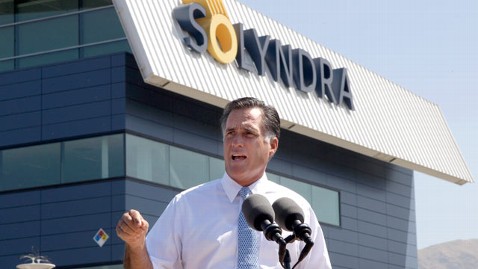Romney and Obama Duel Over Solyndra, Investment Records

Mary Altaffer/AP Photo
After weeks of Democratic attacks on Mitt Romney's record of investments at Bain Capital, Republicans are turning the tables with fresh scrutiny of Obama administration investments in clean energy technology firms, some of which have failed.
The focus of criticism is the solar energy start-up Solyndra, which had been the poster child of President Obama's clean energy initiative and went bankrupt in 2011 after receiving more than $500 million in federal loans. More than 1,000 employees were left out of work.
Romney held a press conference at the shuttered Solyndra headquarters on Thursday, calling it a "symbol of a serious conflict of interest" and a "symbol of how the president thinks about free enterprise."
Federal and congressional investigators are examining questions about the role political influence might have played in Solyndra's selection as the Obama administration's first loan-guarantee recipient. Federal auditors had flagged the loan, saying some applicants had benefited from special treatment.
A new Republican National Committee web video alleges that Obama "ignored many warnings and made risky bets with taxpayer dollars only to see more people lose their jobs, health care and pensions." The Romney campaign hit on a similar theme in a TV ad released earlier this week, highlighting other investments made through an Energy Department loan program that has so far struggled to bear fruit.
"Obama is giving taxpayer money to big donors and then watching them lose it," the ad claims. "Good for them, bad for us."
The RNC also circulated a list of three companies - an electric car maker and two advanced battery producers - which have received millions in federal loan guarantees and are struggling to stay in business and keep jobs in the U.S.
The flurry of messaging is aimed at neutralizing Democratic attacks on Romney's record in private equity which have cast him as a profit-seeking corporate raider who ran roughshod over workers and families. The Obama campaign has been highlighting companies with ties to Romney and Bain that ultimately went bankrupt leaving workers without jobs, health care plans and pensions.
The White House and the Obama campaign have conceded the losses from failed investments like Solyndra but insist the government's overall clean energy portfolio - as part of an "all-of-the above" approach to energy independence - is on the right track.
And officials argue that Republicans share some of the blame for the downsides in investment in an emerging industry.
"Both Republican and Democratic administrations advanced Solyndra's application, and the company was widely praised as successful and innovative both before and after receiving the Department of Energy loan guarantee," said Obama campaign spokeswoman Lis Smith.
White House spokesman Jay Carney repeatedly noted in response to reporters' questions this week that the program was "created under the Bush administration" and that officials have "always acknowledged that not every company invested in would necessarily succeed."
There was bipartisan support in Congress for the Energy Department's loan guarantee program for clean-energy start-ups created by Congress in 2005 and Solyndra's early loan application. However, the financing for Solyndra was ultimately fast-tracked and approved by the Obama administration, despite some red flags about the company's viability.
The funds were also allocated from an entirely new section of the loan program created in 2009 by the American Recovery and Reinvestment Act. The law received no Republican votes in the House and only three in the Senate.
Still, President Obama insists his administration isn't the first or only one to engage in picking winners and losers with taxpayers' cash.
"Understand: this was not our program per se," Obama said in a March interview with Marketplace.
"Congress - Democrats and Republicans - put together a loan guarantee program because they understood historically that when you get new industries, it's easy to raise money for start-ups, but if you want to take them to scale, oftentimes there's a lot of risk involved, and what the loan guarantee program was designed to do was to help start up companies get to scale," he said.
Mitt Romney seemed to share that view at one point in his career, the Obama campaign notes. The former governor's 2008 energy policy platform called for a "dramatic increase" in federal spending on clean energy technology projects.
Romney also presided as Massachusetts governor over the award of $4.5 million in state loans to two biotechnology firms that later went bankrupt, costing taxpayers and jobs. (The Romney campaign says the governor had opposed the funding, though an advisory board that included his appointees and campaign donors approved the measure.)